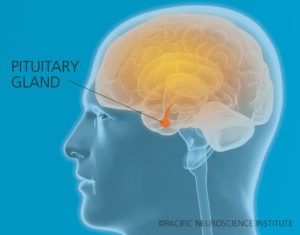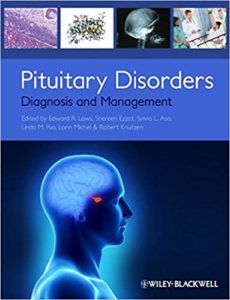

Far Reaching Effects of Pituitary Disorders
by Guest Author
Guest article by Linda M. Rio, M.A., Marriage and Family Therapist
The broad influence of the pituitary gland
Progress is being made to help patients get accurate diagnoses of pituitary tumors and other disorders more quickly. Delays in finding underlying causes of disturbing symptoms have been documented but more and more people are getting to the right doctors. Those “lucky” patients have found top specialists in pituitary tumors and have a team of specialists at a Center of Excellence where innovative medical options and the most highly skilled surgeons offer the best available treatments.
But Western medicine still focuses on the identified patient, which means that others close to the patient often are ignored. The pituitary gland is often called the master gland because it has such a powerful influence throughout the entire body. Dysfunction of this important structure is known to affect many areas of the physical body but also, and lesser known, mental and emotional aspects as well. Any family who has a member dealing with such a powerful force knows that hormonal disruptions can cause family and other relationship disruptions as well.
A family affair
 Chronic and/or serious physical illness of any kind has far reaching effects that go far beyond the actual physical symptoms of the disease. Anyone who has had a family member with cancer, physical disability or other serious and/or chronic issue knows that it is like a stranger has moved into the home and disturbed the entire family. The stress for family, especially caregivers, can be enormous. As a result, roles in the family can even become dislodged. Spouses who were once primary as bread winners may have to reduce or change their employment or even stop work all together. The spouse who is not the “patient” therefore may have to take on additional hours of work or go back to work when this was not the plan. Children become affected too. Sometimes kids need to do more chores and go without homework help or a parent to volunteer at school and after school events. Kids often do not understand a parent’s illness and are sometimes kept in the dark due to mothers’ and fathers’ intentions of trying to protect their young ones. However, problems from this well-intended effort can backfire however.
Chronic and/or serious physical illness of any kind has far reaching effects that go far beyond the actual physical symptoms of the disease. Anyone who has had a family member with cancer, physical disability or other serious and/or chronic issue knows that it is like a stranger has moved into the home and disturbed the entire family. The stress for family, especially caregivers, can be enormous. As a result, roles in the family can even become dislodged. Spouses who were once primary as bread winners may have to reduce or change their employment or even stop work all together. The spouse who is not the “patient” therefore may have to take on additional hours of work or go back to work when this was not the plan. Children become affected too. Sometimes kids need to do more chores and go without homework help or a parent to volunteer at school and after school events. Kids often do not understand a parent’s illness and are sometimes kept in the dark due to mothers’ and fathers’ intentions of trying to protect their young ones. However, problems from this well-intended effort can backfire however.
As disease progresses
Often a serious physical illness comes on suddenly and is obvious by the outward changes seen in the patient. Other times the symptoms are much more gradual so therefore harder for family members and the patient to detect as a part of an illness. Many of the physical and mental/emotional signs of pituitary disorders develop slowly. Patients often report having gone from doctor to doctor to doctor and even seeking psychological counseling all to no avail at finding the root cause. Not only do patients experience a lot of frustration, but also often doubt themselves even though they know something is very wrong but just feel like no one believes them. Many times patients are told “It is all in your head” to only much later discover that was actually true.
The tiny pituitary gland was responsible for most of the disturbing symptoms.
Hormonal, physical and emotional shifts
 People who have raised a teenager know about the highs and lows of hormonal shifts. Women during childbearing years often feel how emotions can shift dramatically at certain times of the month. And, some women during menopause feel intense mood changes. These are normal moods that are influenced by the hormonal system in the body yet can be quite frustrating and difficult not only for the person suffering but for those around them. But when something goes really awry, like a tumor that grows on or around the master gland, the effects are felt far beyond the center of the head. And the availability of hormonal evaluations is not something families are aware of until much later.
People who have raised a teenager know about the highs and lows of hormonal shifts. Women during childbearing years often feel how emotions can shift dramatically at certain times of the month. And, some women during menopause feel intense mood changes. These are normal moods that are influenced by the hormonal system in the body yet can be quite frustrating and difficult not only for the person suffering but for those around them. But when something goes really awry, like a tumor that grows on or around the master gland, the effects are felt far beyond the center of the head. And the availability of hormonal evaluations is not something families are aware of until much later.
Actual outward physical changes to the patient’s body can occur as can occur with Cushing’s disease and Acromegaly. The longer it takes to accurately detect and diagnose the more physical changes can become apparent. Extreme weight gain, changes to facial structure and shape and other external manifestations are not only signs of the illness but frightening for the person affected.
Weight shaming is commonly experienced by patients who have tried early on to get help. Sometimes even physicians have reportedly told patients to “just go on a diet and loose the weight”, inferring that it is easy. Months to years can go by for patients who often blame themselves for their out-of-control bodies. Family members can also be unsupportive, even cruel. This can be due to family members who actually care but feel helpless and lack the knowledge about the complexity of such things as weight gain causality. Months to years to decades of all feeling frustration and anger with the medical system and society in general can cause some patients to withdraw socially, become clinically depressed, even hopeless and suicidal.
In addition to outward physical changes caused by some pituitary disorders other symptoms directly and indirectly affect not only the patient but their family and other relationships as well. It has been documented that clinical depression and anxiety are common with pituitary disorders. Some patients report memory and mental confusion, anger and/or rage and even changes in a patient’s overall sense and awareness of themselves.
These and other mental health conditions are often not linked by medical or mental health professionals as possibly due to a dysfunction with that tiny but important gland. Such symptoms as mood fluctuations can make everyone in a patient’s family ill at ease, even frightened. As a result, patients and family can pull away even more from one another in an effort to protect themselves and loved ones. A downward spiraling of a lack of trust and continued isolation can lead to the fracturing of family bonds and relationship connections.
Finding expert treatment
This all may sound pretty dismal so far. But, there is good news. First, with excellent and highly skilled physicians, pituitary disorders are being detected much quicker and treated better than ever. Centers of Excellence have been established in order to ensure that patients are offered an entire coordinated team of experts. More information is available today, especially with the help of the internet, for patients and their families to find help and such centers. And patients and their families can repair challenged relationships that have been threatened by the effects of the tumor or other hormonal disturbance.
 Individual and family therapy can certainly assist patients and their families with the challenges of navigating the diagnostic and treatment process. It is especially helpful to find a mental health professional who has training in chronic and serious illnesses. Unfortunately, few mental health professionals today have expertise or much knowledge about the specifics of pituitary disorders. Hopefully, this will change soon. So, it is important to know how to find those professionals who are open-minded to learning enough to be helpful and having a willingness to consult with endocrinologists and others as necessary.
Individual and family therapy can certainly assist patients and their families with the challenges of navigating the diagnostic and treatment process. It is especially helpful to find a mental health professional who has training in chronic and serious illnesses. Unfortunately, few mental health professionals today have expertise or much knowledge about the specifics of pituitary disorders. Hopefully, this will change soon. So, it is important to know how to find those professionals who are open-minded to learning enough to be helpful and having a willingness to consult with endocrinologists and others as necessary.
Psychotropic medications may also be helpful and necessary, and psychiatrists can work with the endocrine system especially immediately following surgery or other pituitary treatment. The stigma of mental health is hopefully diminishing as our society recognizes the interplay of the mind and the body. As mental health becomes demystified, seen as just another way to heal and repair, then more and more patients will feel comfortable seeking assistance.
Change can be difficult
Pituitary tumors and other disorders of the neuroendocrine system can certainly bring about change: physical, mental, emotional, and behavioral. And, such changes often disrupt and change family connections and relationships. It is important to understand the illness and its potential impact on all aspects of life. It is vital for patients, their doctors, family and others to communicate about expectations for physical as well as mental health recovery. And, it is also important for all family members to be informed at all steps of the process.
 Children are often seen as being too young to understand but they are highly perceptive and intuitively know when something is off in the family. So even the young ones need to know about any medical challenges a parent or other family member may face. There are tender ways to approach children and even books for even the very young to help explain medical issues. Silence and secrets never improve situations or relationships. If it seems too difficult to find words or know how to discuss such things in the family, then the help of a professional can sensitively help all involved.
Children are often seen as being too young to understand but they are highly perceptive and intuitively know when something is off in the family. So even the young ones need to know about any medical challenges a parent or other family member may face. There are tender ways to approach children and even books for even the very young to help explain medical issues. Silence and secrets never improve situations or relationships. If it seems too difficult to find words or know how to discuss such things in the family, then the help of a professional can sensitively help all involved.
Getting a proper diagnosis and medical treatment is important but pituitary disorders involve a lot more. Patients and their family are also often surprised at the mental and emotional changes that occur for a while even following medical or surgical treatment. The ups and downs of hormonal shifts until things become stabilized can be disastrous without proper expectations and the support of close family members. The family must be considered part of the treatment team, perhaps the most important since they will hopefully be there for a lifetime that follows.
The process of healing can be lengthy and certainly scary but with a skilled treatment team it doesn’t have to be a lonely path.
Last updated: May 6th, 2021